Local News
A taste of Limmud 2020

By MYRON LOVE
Limmud Winnipeg celebrated its tenth anniversary on the weekend of February 29/March 1 with quite possibly its best attendance to date. Close to 400 members of our community had more than three dozen sessions to choose from, with presenters from across Canada, New York and Israel joining local speakers and facilitators in providing a smorgasbord of topics both secular and religious, cultural and culinary.
As usual, this writer indulged in a representative sampling of what was on the menu, balancing local and Israeli issues with some religious study as well as delving into Jewish history. And, while each session could make for an entire feature on its own, space considerations leave me to focus on the highlights.
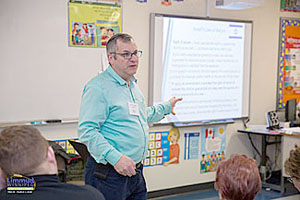
So let us begin the journey.
The first session that I attended was a presentation by former Winnipegger Jack Frohlich, who made a aliyah in 1989 and who, for the past 18 years, has been teaching conversion classes under the auspices of the National Centre for Conversion. He also works closely with the Beta Israel (Ethiopian) community.
Frohlich delivered two presentations – the first discussing the challenges facing Ethiopian Israelis and the second talking about the controversial issue of conversion in Israel. There is much misinformation concerning conversion in Israel, Frohlich pointed out.
My own understanding was that Reform and Conservative conversions are not recognized in Israel and – much to my surprise, there have been Orthodox conversions in North America that also aren’t recognized in Israel. The reality is that the only conversions officially recognized in Israel are those which are approved by the Dayanim (rabbi/judges) associated with the National Centre for Conversion.
As Frohlich noted, even a conversion by a rabbi in solidly Haredi Bnai Brak would not be recognized.
He pointed out that while Reform and Conservative conversions may not be recognized or the converts considered Jewish, they are still welcomed under the Law of Return with all the benefits that come with it.
Then there is the occasional report that converts have to vow to observe all the Mitzvot both during the conversion process and forever after on pain of having the conversion rescinded. Not true, Frohlich said. Once one is accepted into the Jewish community, the individual can life his or her life the same way those who are born Jewish do.
“Becoming a Jew is a two-sided coin,” he said. “It is a two-for-one deal. You are adopting a new religion and you become part of the Jewish People.”
While the original Law of Return applied only to Halachic Jews born of a Jewish mother, he noted, in 1970, the government expanded the Law of Return to include anyone with at least one Jewish grandparent – even though the individual would not be considered Jewish per se.
Of the Russian immigrants who came to Israel in the 1990s, Frohlich pointed out, about 50% were not halachically Jewish.
He reported that Israel registers about 2,500 conversions a year with most of the converts being women. “Weddings often follow,” he said.
Quite a number of Filipinos (Filipinas?) and Arab Moslems are among the converts, he noted.
And the government and the rabbinate continue to make the conversion process easier, he added. In recent years, all fees have been removed and a more flexible approach has been adopted for the learning process.
“Most students are pleasantly surprised by their ulpan/educational experiences,” Frohlich said.
He reported that about 80% of conversion applicants are approved the first time they appear before the Bet Din with the remainder often approved following a few more months of studying.
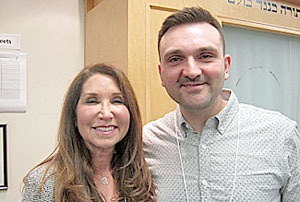
From Israel, we travel back to Winnipeg to hear the story of Shimon Segal. The 33-year-old criminal lawyer began life with the deck stacked against him. He has succeeded in life through his own inner strength and the love and support of David and Glenda Segal and their sons, Devin and Ryan.
Segal was born into a strictly Orthodox – but dysfunctional family. Over his first few years, he was imbued with Orthodox practice and tradition and a strong Jewish identity. The middle of three children, he recalls a lot of arguing in the home.
He began his schooling in the Hebrew Bilingual program at Centennial School in the North End. After Grade 2, he recalled, the family moved south, where his parents became less and less observant and opened a grow-op in their home. “The house was always moldy and dirty,” he remembered.
While attending Brock Corydon’s Hebrew Bilingual program, he made some friends among his classmates -, in particular, Devin Segal.
The Jewish Child and Family Service first stepped into the family situation when he was seven. He noted that his mother was abusive and his father disinterested.
When he was ten, his parents split and he found himself back in the North End in a group home where he was the only Jewish kid. “I was living a double life,” he recalled. “I was taking the bus to Brock Corydon every day. At the group home, I started smoking cigarettes and marijuana and wearing gang clothes to try to fit in. I would show up at school smelling of cigarettes. I didn’t fit in anywhere. While I remained close to my friends at Brock Corydon, most of their parents didn’t approve of their sons hanging out with me.”
The exception was David Segal. “My dad (David Segal) began to be involved in my life when I was ten,” Shimon said. “He took an interest in me. He would take me fishing sometimes. There was no sense of judgment. I relaxed when I was with him.”
For a short time, Segal was housed with foster parents Barry and the late Marsha Weber, to whom he is also grateful. The Webers took in foster children for short periods of time.)
At the age of 12, he was returned to his birth mother for a time. That didn’t work out. He spent some time in the Manitoba Youth Centre and with a Christian foster family who sent him to a bible camp. “They were only in it for the money,” he said of those foster parents.
“I began spending more and more time with the Segals,” Shimon said.
After several excruciating weeks with the Christian family, he was returned to his birth father who, after a short time, locked him out of the house.
That was when his life really took a turn for the worse. He ended up living on the street in Tuxedo. “I tried Osborne Village, but it felt too dangerous,” he recalled. “In Tuxedo, I felt safer. I slept wherever I could – partially-built buildings, a friend’s mother’s station wagon, even in the Assiniboine Forest for a time.”
It wasn’t long after that David and Glenda Segal invited him to move in with them permanently and become a member of the family. “David and Glenda became my dad and mom and Devin and Ryan my new brothers.”
He added that he has kept in touch with his own birth siblings – a brother and sister- and that the Segal family has included them in family gatherings.
The love and support from his new family, Shimon said, enabled him to rekindle his inner Jewishness and feel part of the Jewish community again.
Over the last ten years, Segal has been able to earn a law degree. He has married and become a father. And he has given back to the community and, through his legal work, other vulnerable people.
“Thanks to the Segal Family, I have been able to live a normal life,” he said.
“What the Segal Family did for Shimon was amazing,” said Randee Pollock, the Jewish Child and Family Service’s Adoption, Fostercare and Rescue Co-ordinator. “Our goal is to keep families together – but that is not always possible where there are mental health or addiction issues or perhaps there has been a death in the family.”
She reports that the JCFS currently has 15 Jewish children in care with nine foster homes and three places of safety available to house them. “We are always in need of more Jewish families who are willing to open their homes to children in our community who are in need of shelter,” she noted.
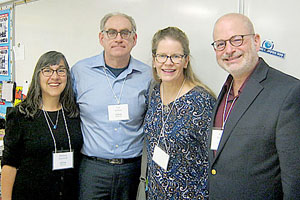
From Winnipeg, we again pack our bags for our third port of call as we follow Rabbi Mark Glickman, the spiritual leader of Reform Congregation Temple B’nai Tikvah in Calgary, as he travels the world in search of the lost story of the Cairo Genizah.
Glickman is the author of “Sacred Treasure – the Cairo Genizah: The Amazing Discoveries of Forgotten History in an Egyptian Synagogue Attic”. (He also delivered a talk at Limmud in 2016 about his follow-up book, “Stolen Words: The Nazi Plunder of Jewish books”.)
Glickman’s research took him to archives at Cambridge University and the Jewish Theological Seminary in New York – the world’s two largest repositories of Genizah documents – and, accompanied by his son, Jacob, to the Ben Ezra Synagogue in Cairo, which was the original repository of the Genizah.
So, you might be wondering what a “genizah” is? As Glickman pointed out, we are a People of the Book. Under Jewish Law, it is not allowed to throw out sacred books. The proper way to dispose of them is burial in a Jewish cemetery. But they have to be stored somewhere until they can be buried. In my own synagogue, the genizah – or storage space – is a cupboard downstairs. For many centuries in the old Ben Ezra Synagogue in Cairo, it was a space – a hole in the wall in the women’s section upstairs.
The current Ben Ezra Synagogue, Glickman reported, was built in the 11th century on the banks of the Nile, replacing an earlier shul which was destroyed by flooding. In the Middle Ages, he noted, Egypt was home to a large and influential Jewish community one of whose most prominent members was the great Rabbi Moses Ben Maimon (aka Maimonidies aka the Rambam).
There are a number of Western characters associated with the discovery of the treasure trove of documents that were stored in the Ben Ezra genizah. The first outsider to appear on the scene was one Simon Von Geldern, a German Jewish adventurer and Orientalist who moved in Bedouin circles. He visited the Genizah, but took nothing from it.
Then there came a Rabbi Jacob Saphir, a dealer in Jewish documents in Jerusalem, who heard about the Genizah from Van Geldern, dropped in, and brought back about 1,000 documents for sale. Next was Abraham Firkovitch, a member of the breakaway Karaite sect – who came in search of documents of historical interest to the Karaite community.
In the 1880s, Elkan Nathan Adler, a prominent member of England’s Jewish community – and son and brother of Chief Rabbis of England, visited and left with more than 6,000 documents (as possibly a Torah cover).
The scholarly interest in the Genizah, Glickman noted, began in 1996 when Rabbi Solomon Schechter – then teaching at Cambridge University, had an encounter with an unusual colleague. Twin sisters Agnes Smith Lewis and Margaret Dunlop Gibson were Semitic scholars and travellers who had recently returned from an expedition to St. Catherine’s Monastery at Mount Sinai. Among the documents they brought back was one in a language that the two multi linguists didn’t recognize. They asked Schechter if he could help. He recognized it as a tractate for the book Ben Sira, a book of wisdom that had not been included in the Talmudic canon. The book at that time was only known from a Greek translation.
“The last person to have seen that book in the original Hebrew was Saadia Gaon over 1000 years before,” Glickman noted. “The document was from the Ben Ezra Genizah. Schechter – very excited by this find – quickly arranged to visit the genizah and subsequently transferred close to 200,000 documents to Cambridge for translation and study.”
The documents – 300,000 in total – consisted not only of religious material but also letters, business records, medical prescriptions and the other detritus of every day life. Among the documents that Glickman highlighted was the oldest piece of Jewish sheet music (composed by an Italian Catholic priest who had converted to Judaism), an early Hebrew reading primer and the last letter that Maimonides received from his beloved younger brother, David, before the businessman was lost at sea en route to India.
Over the past 20 years, Glickman reported that advances in computer technology have made translating the documents and connected fragments much easier. He noted that the Freidberg Genizah Project was established in 1999 as a non-profit international humanities venture established by philanthropist Albert Friedberg of Toronto to promote and facilitate research of the material discovered in the Cairo Genizah. Under the aegis of the project, all of the genizah materials are in the process on being inventoried and put online.
Glickman completed his presentation with a video of himself peering into the now empty genizah.
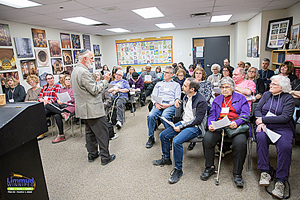
And we conclude with a little Torah study led by Rabbi Yosef Benarroch, spiritual leader of the Adas Yeshurun Herzlia Congregation. His question: Does being religious make you a better person?
In contemplating the question, Rabbi Benarroch first turned to the story of creation, noting that while the Lord commented after each of the first five days of creation that work was “good”, He does not say the same about His creation of mankind. Rather, the Torah says that the Lord “created Man in his image”.
So what does that mean? Benarroch quoted Torah and referred to several rabbanim – including Rabbi Akiva, Rambam and the late modern sages, Rabbis Joseph Soloveitchik and Abraham Joshua Heschel – as well as talmudic commentaries and their interpretations. One suggestion that Benarroch made is that of all G-d’s creations, man is the only one that can also create.
And while G-d doesn’t have an “image” in the way that man does, He does have attributes that can well be emulated – being slow to anger and quick to forgive, compassionate, gracious and merciful – attributes that are part of a prayer shul goers sing on Pesach, Shavuot and Sukkot before taking out the Torah and at Selichot in the days leading up to the High Holidays.
So, while engaging in regular religious practice itself doesn’t determine good or bad behavior, Rabbi Benarroch concluded, attempting to model your life after the qualities exhibited by the Lord – in His image – will, without a doubt make one a better person.
Local News
Second annual Taste of Limmud to feature Jewish dishes from around the world

By MYRON LOVE Many words in English have multiple meanings. Take the word “taste” for example. There is the literal meaning – the sense of taste; it can also mean sample – or preferences. It can be a noun or a verb.
In “A Taste of Limmud,” the term is used both in its literal meaning – as a sampling of Jewish dishes from different parts of the world, as well as a prelude to our community’s upcoming 16th celebration of Jewish learning and culture, which is scheduled for Sunday, March 15.
This is the second year for “A Taste of Limmud,” which is coming up on Thursday, February 19. The event will be held at the Shaarey Zedek and will feature Jewish dishes from Argentina, Yemen, Turkiye, Aleppo and Eastern Europe, as well as Israel .
“We sold out last year for A Taste of Limmud,” reports Raya Margulets, Winnipeg Limmud’s newly appointed co-ordinator. “We had 120 participants last year. I am hoping to have 150 this year.”
The 2025 debut of “A Taste of Limmud” was actually Margulets’ introduction to the Winnipeg Limmud co-ordinating team. Originally from Israel, Margulets’ first position with the Jewish Federation of Winnipeg was in 2022 when she was appointed Hillel director – after she had served as Hillel student president at the University of Manitoba.
She left her role with Hillel after having served as director for two years to participate in the ten-month online Israel 21c Digital Ambassador program, which is aimed at young people between the ages of 18 and 25. That program is part-time and casual, conducted remotely, intended to provide basic experience in digital communication and storytelling focused on everyday life in Israel.
“I spent a few hours a week working on simple digital content and social media, attended occasional online seminars, and participated in light collaborative projects,” Margulets reports. “The focus was on sharing positive, apolitical cultural stories rather than politics or advocacy.”
She was hired last year to oversee our first Taste of Limmud – as a special project that was funded by the Jewish Foundation of Manitoba.
She was appointed at the beginning of September as Limmud Co-ordinator, replacing Florencia Katz, the original co-ordinator, who stepped away after 15 years in the role. Katz remains a member of the Federation staff as Director of Education and Engagement. She also has a focus on the PJ Library program.
“Florencia was a great mentor and is still a big help to me,” Margulets says.
She reports that the upcoming 16th annual Winnipeg Limmud will once again feature a wide and eclectic range of speakers. “I can confirm that all of our community’s rabbis – as well as Rabbi Benarroch – will be among the presenters,” she notes. “Rabbi Benarroch will be coming from Israel and be here in person.”
Also confirmed thus far are Yaron Deckel, an Israeli journalist and broadcaster, as well as Haskel Greenfield, Distinguished Professor of Anthropology, and Winnipeg’s own Rimon Art Collective. Collective members include young Jewish artists Mishelle Aminov Kosonovsky, Yael Freifeld, Etel Shevelev, Halley Ritter, and Shan Pullan
Stay tuned for further updates as to other 2026 Winnipeg Limmud presenters on this website or go online to keep up to date or register for programs at limmudwinnipeg.org.
Local News
Sharon Delbridge’s annual health & wellness retreats in Puerto Vallarta have become popular with many Winnipeggers

By BERNIE BELLAN Over the years we have revisited stories from time to time – to catch up with individuals who have made a mark in this city and to see where their lives have taken them since the last time we wrote about them.
One such individual is Sharon Delbridge, the youngest daughter of Sol and Rachel Fink, and younger sister to Percy, Shayla (Posen), and the late Sheldon Fink (who died all too young at the age 57 in 2021).
Myron Love has written many times about Sol and Rachel Fink, who continue to amaze for their vitality – with Sol now 101 and Rachel having just turned 99.
As Sharon notes in an email sent to me, “My parents work out everyday. Not at Rady anymore. They do exercise at home & in their condo gym (200 Tuxedo) Move their bodies daily. My mom leads her and my dad daily in movement. It’s incredible.
“They have been a huge inspiration to all of us.”
Aside from the fact that the Fink family was a very musical family, their penchant for fitness is clearly something that rubbed off on Sharon, in particular.
My own wife, Meachelle, who was quite the fitness fanatic herself in her day (not that she’s been put out to pasture quite yet), profiled Sharon for The Jewish Post & News in 2015. In that story, Sharon explained how she came to be one of the most popular and best known fitness instructors, not only at the Rady JCC – where her classes in a wide variety of different areas, were – and still are, extremely popular, but at many other venues throughout Winnipeg.
Here’s part of what Sharon told Meachelle about how she came to teach so many different types of fitness classes:
“I’ve been into fitness my whole life. I come from a very musical family but also a family that always works out. When I was in my 20s I was teaching aerobics for several years as a part-time job while in university. When I had my three children (Milan, Jared and Cassie Ackerman) I ran a hand-painted clothing business in my home called Milan Designs, and I sold to ladies’ and children’s stores all over Canada.
“I was always working out and have loved fitness classes. I went back and got more certifications in my 40s. I’m certified to teach many specialties and have been actively teaching at the Rady for over 10 years. I now specialize in women’s boutique fitness: Zumba, Yoga and Barre classes. The three specialties blend beautifully together and I have a big following of people from all over Winnipeg that come to my classes. I have every Zumba certification that’s available: Zumba, Zumba Gold (for seniors), Zumba Toning (with weights), Zumba Aqua (in water), Zumba Step and Zumba Sentao (using steppers and chairs).
“I’ve taken many yoga certifications through the past 10 years and I’ve been teaching Barre classes, which are the latest and hottest classes for women. I’m always taking new training in these three specialties to continue to stay fresh and always have new and exciting things to present to my class. That’s how I stay unique in my field. I’m always learning and always developing my classes to be the best they can be. I spend tons of time finding the best music and choreographing.
“I truly feel that if you work out and look after your body, you will always have a positive outlook on life. Exercise is a huge healer mentally and physically. I have seen so many incredible changes in women that come to my classes. They have transformed their bodies and live happier and healthier lives.”
It was a year after Meachelle’s article about Sharon that Sharon and her husband, Darcy, began going to Puerto Vallarta for the winter. As Sharon noted, “I started teaching at a Yoga studio the first winter we were here in PV. It’s easy to meet people & build community when you’re teaching snowbirds from everywhere
I love sharing my love for fitness & yoga & moving our bodies.”
But, for six years prior to making Puerto Vallarta her and Darcy’s winter home, Sharon had already been conducting annual one-week health and wellness retreats in Puerto Vallarta. She has continued to conduct those retreats every year since. The most recent retreat was held from January 25-February 1 at the Fiesta Americana All Inclusive Resort.
Here’s how Sharon describes the purpose of those retreats:
“For over 15 years, my Health & Wellness Retreat has brought together women of all ages to reconnect, recharge, and celebrate movement, friendship, and balance. Hosted at a beautiful all-inclusive resort, guests can truly make the week their own holiday experience. While primarily a women’s retreat, many now bring their husbands or partners who are welcome to participate as much or as little as they choose.
“Throughout the week, we offer seven daily classes ranging from sunrise meditation and yoga to toning, Zumba, yin yoga, and our signature Aqua Zumba — which transforms into a high-energy, joy-filled pool party. Each evening, we gather for sunset yoga and take time to celebrate the beauty of the day together.
“The retreat blends wellness with enjoyment, allowing guests to indulge in the resort’s wonderful restaurants and social atmosphere while still feeling strong, energized, and revitalized. It’s a balanced, uplifting experience where participants leave feeling nourished in body, mind, and heart, often forming lifelong friendships. This year, we were proud to welcome 40 participants.”
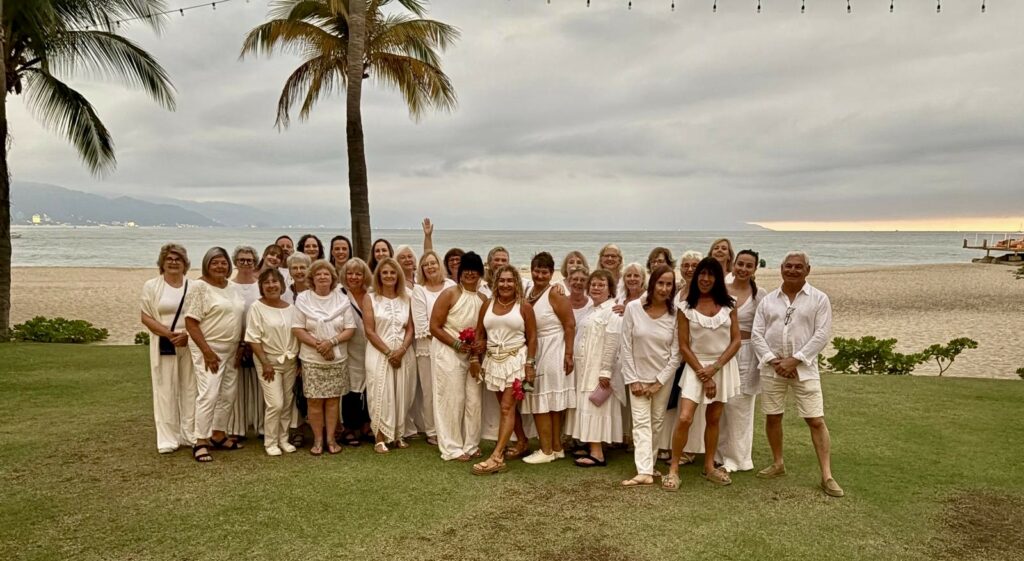
In the picture accompanying this article you might recognize several Winnipeggers. I asked Sharon how many Winnipeggers were participants in this year’s retreat?
The answer, she said, was the majority (31) were from Winnipeg, while six were from Las Vegas, one from Ottawa and two from Edmonton.
The last two years, Sharon also noted, another well known member of the Rady JCC staff, Dona Watts-Hastings, who’s a physiotherapist, also a yoga and Pilates instructor, has joined Sharon in conducting the retreat. Sharon adds that Dona’s physiotherapy clinic is inside the Rady JCC. Dona also brings some of her clients to the retreat.
I wondered though, how active Sharon is in teaching classes when she’s back in Winnipeg? Does she never tire of teaching so many classes? I wondered.
Sharon’s answer was: “Yes, I’m still in Winnipeg half of the year and I will always teach at the Rady… Zumba, sculpt , yoga & barre class – also spinning if they need me to sub. . I teach at Assiniboine park and other gyms, too. Every morning I teach and often sub other classes. Busy all spring & summer.”
Whew! It’s tiring just reading about everything Sharon does. If you would like to find out more about next year’s health & wellness retreat in Puerto Vallarta and how you might be able to join up, contact Sharon at sharon@freshsoulfitness.com.
To watch a video of what a typical day at the retreat consisted of go to freshsoulfitness
Local News
Jess Pudavick: artist and business executive

By MYRON LOVE Jess Pudavick is a rare individual in that she combines careers as an artist and a business executive.
I first became aware of Jess last summer when she was one of the artists/craftspeople with a display table at the Gwen Secter Creative Living Centre’s annual garage and craft sale. What piqued my interest was her focus on incorporating resins in her art pieces.
Last week, while interviewing Ms. Pudavick at Super-Lite Lighting on Waverley – I learned much more about the multi-talented Ms. Pudavick.
While I have a passion for art,” she notes, “I was not interested in becoming a stereotypical starving artist.”
The daughter of Stuart and Beth Pudavick joined the company (which her father acquired in the early 1980s (along with partners Simon Simkin and Allan Hochman) 17 years ago. Her brother, Ray, also joined the company 10 years ago, Jess notes.
At Super-Lite, Jess’s title is Custom Homes Lighting Consultant. She works with builders, designers and contractors to build the lighting for the home, as well as to choose the right lights for the space. She also manages the company’s social media and website.
“I enjoy working with my dad and Ray,” she says.”I also love what I do at Super-Lite. It is similar to my feelings about my art. You don’t know the end result when you start. It is nice to see something being built from nothing and seeing the end result – and knowing how happy the client is in the end.”.
As an artist, the graduate of Brock Corydon’s Hebrew Bilingual Program, Shaftesbury Collegiate and the University of Manitoba, recalls that she started at a young age. “As a kid,” she says, “I was always doodling and drawing cartoons.”
While she has worked with several different artistic media, she observes that what she likes about creating art with resins is the challenge.
“Resin is a temperamental material,” she points out. “When you start a project, you have no idea what the finished product will look like.”
She explains that there are two ways to work with resin. You can put traditional resin in a mold and wait 24 hours for the resin to dry. Or you can speed up the process by using a UV style resin and exposing the resin to UV rays.
“I prefer letting the resin dry naturally,” she says. “I find I have more control over it.”
Her resin-infused art comes in many forms. She produces earrings and necklaces, candle holders and ashtrays, dice and computer keys. She has also created resin-infused mahjong and rummikub tiles and even sets of dominoes with paw prints. A popular item, Jess says, is a custom coloured/theme wedding set of dominoes.
“People love them,” she says of the dominoes tiles.
(The latter reflects her own passion for dogs for which she is often a foster “parent”. She notes that she also creates resin-infused memory keepsake urns for the ashes/hair or fur of beloved pets – a product that is gaining popularity.)
Then there is the resin-infused coffee table that has a place of honour in her own home. “With my love of plants and resin, my partner and I took our existing coffee table, added various clippings of my own plants and created a fun resin-sealed table,” she recounts. “It really looks cool. It is unique. it attracts visitors’ interest. Every time I look at it, I see something different.”
Jess reports that generally sells her works of art through craft sales and her Instagram page (@thejesso09) for between $10 and $30. Her major source of sales though, she adds, is through word of mouth.
But Pudavick avers that she doesn’t do her art with an eye to sales.
“I create for myself, not for the approval of others. I find it relaxing – a good way to reduce stress. It’s also rewarding to see that others want something you have created.”
She strongly believes that enjoying your work is an important element in being happy. Equally important, she notes, – both in business and art – is to have satisfied customers.


